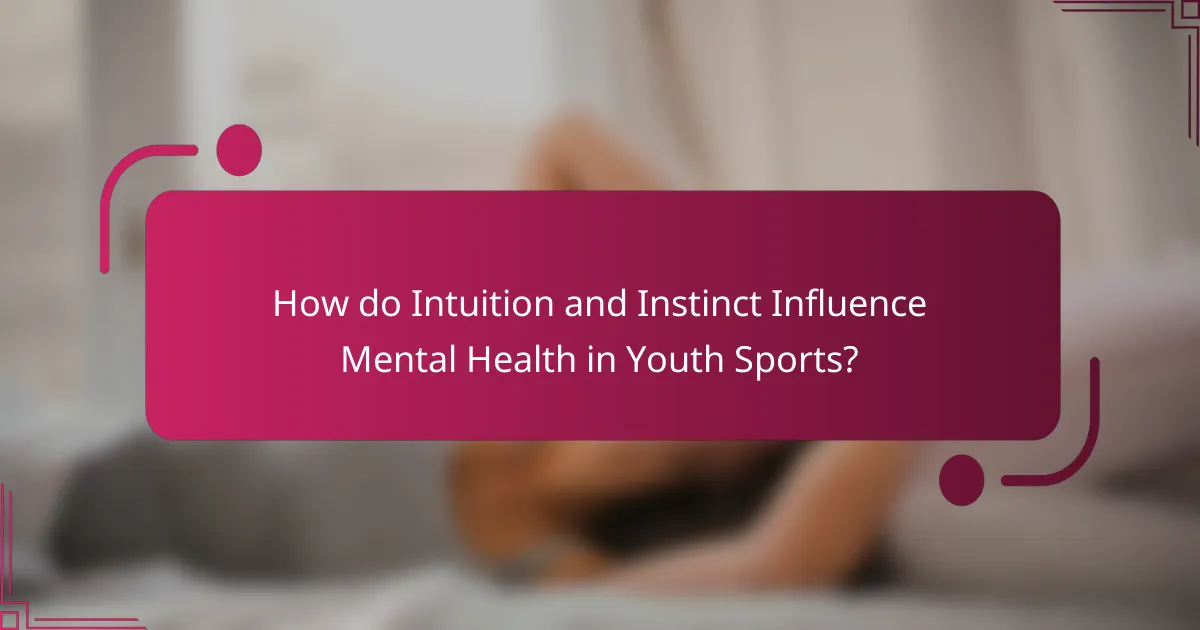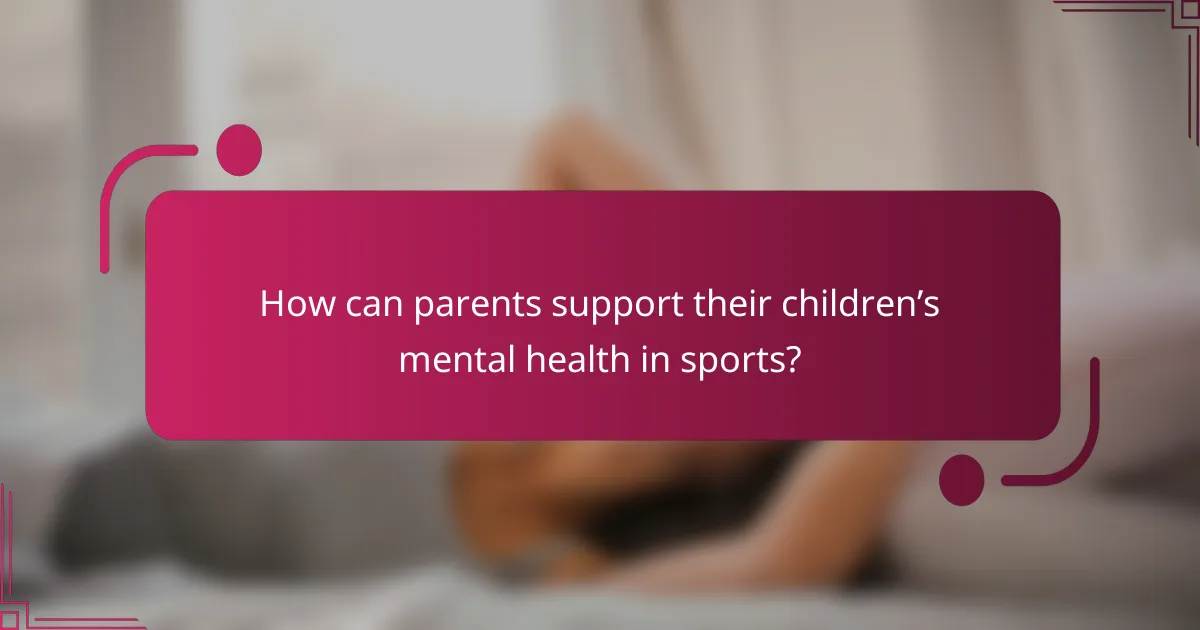Understanding the difference between intuition and instinct is crucial for enhancing mental health in youth sports. This article explores how these factors influence decision-making and emotional responses, addresses common mental health challenges faced by young athletes, and highlights unique strategies for fostering resilience and focus. It also emphasizes the role of parents and coaches in supporting emotional well-being alongside athletic performance.

How do Intuition and Instinct Influence Mental Health in Youth Sports?
Intuition and instinct significantly influence mental health in youth sports by shaping decision-making and emotional responses. Intuition helps athletes make quick, often subconscious choices based on experience, while instinct drives immediate reactions to stimuli. Both can enhance performance and well-being by fostering confidence and reducing anxiety. Research indicates that athletes with strong intuitive skills tend to experience lower stress levels and improved focus, contributing to better overall mental health. Developing these attributes can lead to a more positive sporting experience, emphasizing the importance of mental training in youth sports programs.
What are the definitions of Intuition and Instinct in the context of sports?
Intuition refers to the ability to understand or know something without conscious reasoning, often guiding athletes in decision-making. Instinct, on the other hand, is an innate, automatic response to stimuli, crucial for quick reactions in sports. Both play significant roles in enhancing youth sports performance and mental well-being.
How do Intuition and Instinct differ in decision-making for young athletes?
Intuition and instinct differ in decision-making for young athletes primarily in their sources and applications. Intuition is a subconscious understanding developed through experience, while instinct is an innate response to stimuli.
Young athletes often rely on intuition to assess situations based on past experiences, enhancing their decision-making in dynamic environments. For example, a football player may intuitively know when to pass based on previous plays. In contrast, instinct prompts immediate reactions, such as dodging an opponent, often without conscious thought.
Understanding these differences can aid coaches in fostering mental health and performance. Encouraging intuition through practice can build confidence, while recognizing instinctual responses can improve reaction times. Balancing both can enhance overall well-being in youth sports.

What are the universal mental health challenges faced by youth in sports?
Youth in sports face universal mental health challenges such as anxiety, pressure to perform, and social isolation. These issues can significantly impact their performance and overall well-being. Anxiety often stems from fear of failure or not meeting expectations, leading to decreased confidence. The pressure to excel can create stress, resulting in burnout or withdrawal from sports. Social isolation may occur if young athletes feel disconnected from peers or lack support systems. Addressing these challenges requires a holistic approach that prioritizes mental health alongside physical training.
How does performance pressure impact mental well-being?
Performance pressure negatively impacts mental well-being by increasing anxiety and stress levels in young athletes. This pressure can lead to burnout, reduced self-esteem, and mental health disorders. Research indicates that athletes experiencing high performance expectations often struggle with emotional regulation, which can hinder their overall enjoyment of sports. Furthermore, fostering a supportive environment can mitigate these effects, promoting resilience and healthier coping strategies.
What role does competition play in shaping mental health?
Competition can significantly impact mental health in youth sports. It fosters resilience and motivation but may also lead to anxiety and pressure. Balancing competitive drive with well-being is essential for healthy development. Research indicates that supportive environments mitigate negative effects, enhancing overall mental health outcomes.

What unique mental health strategies can enhance youth sports performance?
Unique mental health strategies can significantly enhance youth sports performance by fostering resilience and focus. Techniques such as mindfulness training improve concentration, while cognitive behavioural strategies help manage anxiety. Incorporating positive self-talk can boost confidence, leading to better performance outcomes. Additionally, establishing a supportive team environment promotes emotional well-being, which is crucial for young athletes. These approaches not only enhance performance but also contribute to overall mental health.
How can coaches foster a supportive environment for young athletes?
Coaches can foster a supportive environment for young athletes by prioritising open communication and emotional well-being. This approach encourages athletes to express their feelings, enhancing mental health and performance.
Building trust is essential; coaches should actively listen and validate athletes’ experiences. Incorporating team-building activities can also strengthen relationships, creating a sense of belonging.
Recognising individual achievements, no matter how small, boosts confidence and motivation. Providing constructive feedback rather than criticism helps athletes develop resilience and a growth mindset.
Ultimately, a supportive environment nurtures both mental health and athletic performance, ensuring young athletes thrive in their sports journey.
What techniques can athletes use to develop their intuition?
Athletes can develop their intuition through mindfulness practices, visualization techniques, and reflective journaling. Mindfulness enhances awareness of thoughts and feelings, allowing athletes to make quicker decisions. Visualization helps athletes mentally rehearse scenarios, improving instinctual responses. Reflective journaling encourages self-assessment, fostering deeper understanding of personal experiences and decision-making patterns.

What are the rare but critical mental health issues affecting young athletes?
Young athletes face rare but critical mental health issues, including performance anxiety, overtraining syndrome, and burnout. These conditions can significantly impair their well-being and sports performance.
Performance anxiety manifests as intense fear of failure, affecting concentration and enjoyment. Overtraining syndrome occurs when athletes push beyond their limits, leading to fatigue and decreased performance. Burnout, characterised by emotional exhaustion and detachment, can result from prolonged stress and pressure to excel.
Addressing these mental health issues requires awareness and supportive interventions. Coaches and parents should foster open communication and prioritise mental well-being alongside physical training.
How can athletes recognize and address burnout?
Athletes can recognise burnout by monitoring physical fatigue, emotional exhaustion, and decreased performance. Addressing burnout involves prioritising rest, seeking support, and adjusting training intensity. Recognising these signs early can prevent long-term mental health issues and enhance overall well-being.
What are the signs of anxiety disorders in youth sports?
Youth sports participants may exhibit signs of anxiety disorders through physical symptoms, emotional distress, and behavioural changes. Common indicators include excessive worry about performance, avoidance of competition, and changes in appetite or sleep patterns. Recognising these signs early can enhance mental health support and improve overall well-being in young athletes.

How can parents support their children’s mental health in sports?
Parents can support their children’s mental health in sports by fostering a positive environment and encouraging open communication. Prioritise emotional well-being alongside athletic performance.
Encourage children to express their feelings about competition and stress. Active listening helps validate their experiences. Promote balance by allowing time for relaxation and hobbies outside of sports.
Recognise the signs of mental strain, such as changes in behaviour or mood. Intervene early to provide support or seek professional help if needed.
Model healthy coping strategies, such as mindfulness and stress management techniques. This helps children develop resilience and emotional intelligence.
What communication strategies can strengthen the parent-athlete relationship?
Effective communication strategies that strengthen the parent-athlete relationship include active listening, open dialogue, and setting shared goals. Active listening fosters trust and understanding, allowing parents to support their child’s emotional needs. Open dialogue encourages athletes to express their feelings, reducing anxiety and enhancing performance. Setting shared goals aligns expectations and creates a collaborative environment. These strategies contribute to improved mental health and overall well-being in youth sports.
How can parents help their children balance sports and academics?
Parents can help their children balance sports and academics by establishing clear priorities and routines. They should encourage open communication about stress and time management. Setting realistic goals for both academics and sports can foster a healthy balance. Additionally, promoting rest and recovery is essential for mental health and performance.

What best practices can enhance mental well-being in youth sports?
To enhance mental well-being in youth sports, focus on fostering a supportive environment. Encourage open communication, promote teamwork, and prioritise enjoyment over competition. These practices help build resilience and improve overall mental health.
1. Foster open communication with athletes about their feelings and concerns.
2. Encourage teamwork to create a sense of belonging and support.
3. Prioritise enjoyment of the sport to reduce pressure and anxiety.
4. Implement regular mental health check-ins for athletes.
5. Educate coaches on recognising signs of mental distress.
6. Promote a balanced approach to training that includes rest and recovery.
What are the key takeaways for promoting mental health in young athletes?
Promoting mental health in young athletes requires a focus on emotional support, open communication, and resilience training. Encouraging a positive environment enhances performance and well-being. Programs should integrate mental health education, emphasising coping strategies and stress management. Regular check-ins with coaches and mental health professionals can identify issues early, fostering a culture of support.
How can young athletes cultivate resilience through sports?
Young athletes can cultivate resilience through sports by embracing challenges and learning from failures. Engaging in competitive environments fosters adaptability and perseverance, essential traits for mental health. Research shows that athletes who face setbacks develop stronger coping mechanisms, enhancing their overall well-being. Additionally, mentorship from coaches and peers reinforces positive self-talk and emotional regulation, further supporting resilience.
What common mistakes should be avoided in supporting youth athletes’ mental health?
To support youth athletes’ mental health effectively, avoid these common mistakes: neglecting open communication, imposing unrealistic expectations, overlooking individual differences, and failing to prioritise mental well-being alongside physical training. Each mistake can hinder athletes’ performance and overall health.
Neglecting open communication can lead to misunderstandings and feelings of isolation. Imposing unrealistic expectations creates unnecessary pressure, affecting athletes’ confidence. Overlooking individual differences ignores unique mental health needs, which can vary greatly among youth. Lastly, failing to prioritise mental well-being risks burnout and disengagement from the sport.